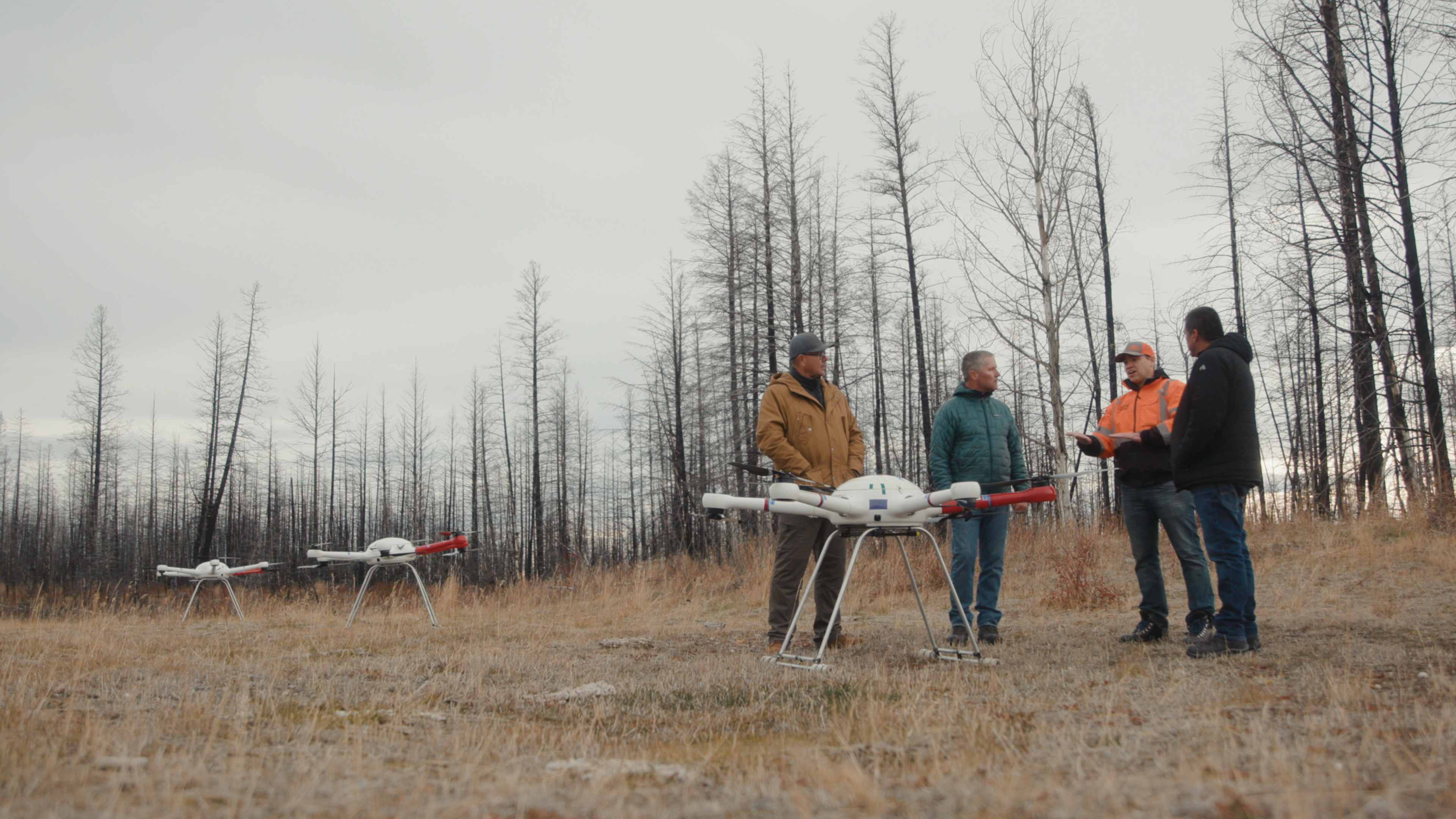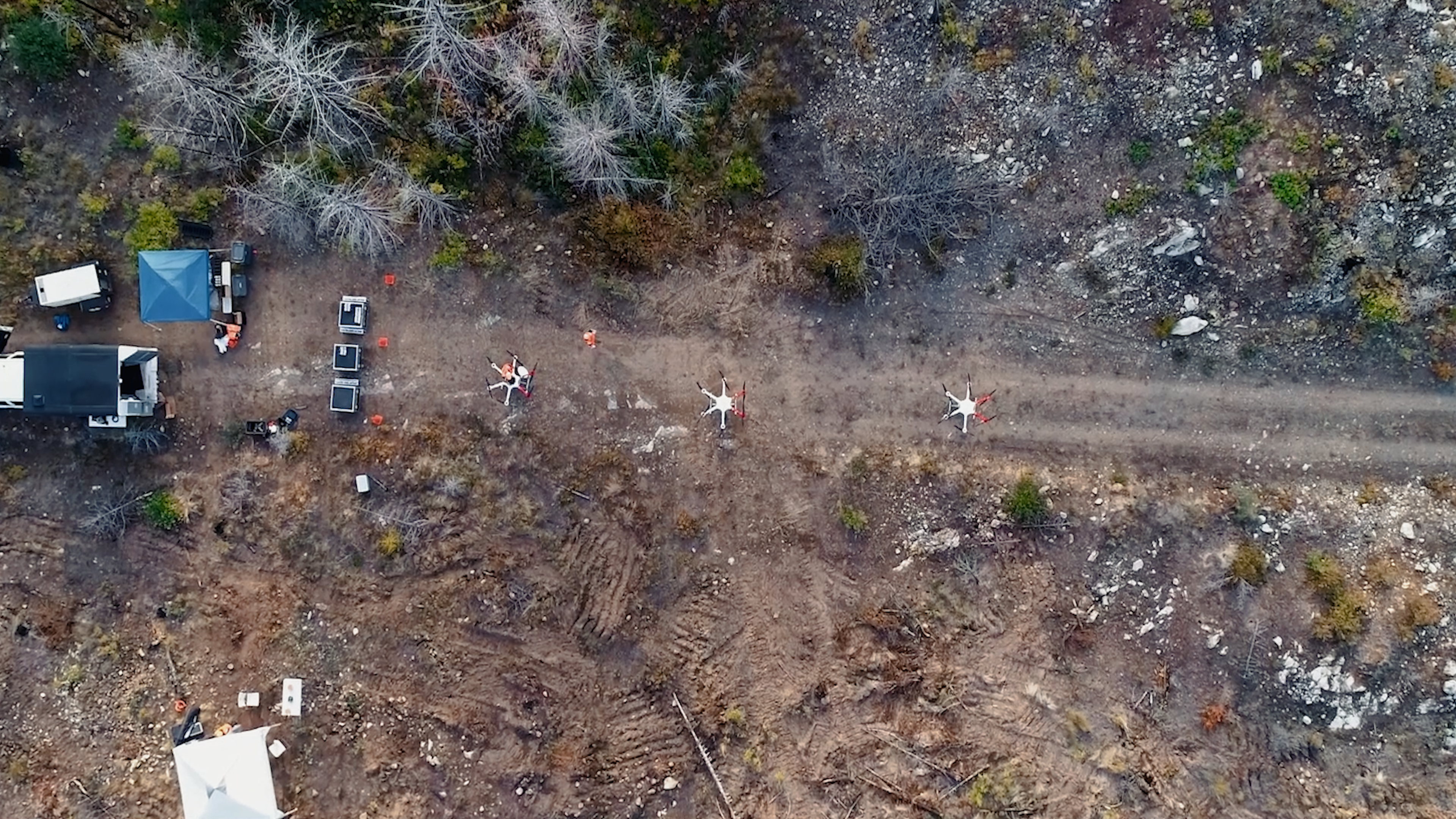Central Chilcotin Rehabilitation: An Indigenous-led company using drone technology for post-fire reforestation
In 2017, Central Chilcotin Rehabilitation Ltd. (CCR) was founded with a primary focus on rehabilitating dead pine stands in the Chilcotin region and transforming them into productive forests. The company was established as a joint venture between the Tsideldel First Nation and the Tl’etinqox Government.
The technology CCR has been experimenting with helps with post-fire reforestation by using several tree-planting techniques including drones to distribute seed pucks quickly and safely in areas where traditional tree-planting methods are challenging. In the fall of 2021, the company conducted a trial project that utilized drones to distribute over half a million seed pucks in an area spanning nearly 54 hectares.
We spoke to Percy Guichon, CCR’s CEO about the company’s unique use of technology for post-fire reforestation and other uses of drones in the forest sector.
 Left to right: Paul Grinder (Tl’etinqox Government), Dave Conly (FESBC), Grant Canary (Drone Seed), Percy Guichon (Tŝideldel First Nation).
Left to right: Paul Grinder (Tl’etinqox Government), Dave Conly (FESBC), Grant Canary (Drone Seed), Percy Guichon (Tŝideldel First Nation).
What makes CCR unique?
PG: CCR’s forest management is done through a First Nations lens with a focus on the innovative use of technology, commitment to forest restoration in the Chilcotin plateau area, and forests for generations.
Despite being a young company, CCR has already gained the trust of major companies and organizations to lead important forest management work. CCR’s success in securing grant funding from a variety of organizations, including the Forest Enhancement Society of BC, Natural Resources Canada, Shell Canada, and working in collaboration with companies like Tolko, Drax, and Atlantic Power, is a testament to the company’s reputation and dedication to its mission.
This trust has been further bolstered by the company’s recent award by the BC Achievement Foundation under the Business Partnership of the Year in 2022 category, as well as nominations for the SME Small Business BC and Small Business of BC Awards.
CCR is a completely First Nations owned company, which is reflected in its commitment to creating economic opportunities for Indigenous communities while promoting sustainable forestry practices. The company’s ability to provide employment during the pandemic was particularly noteworthy, demonstrating its resilience and dedication to supporting local communities. Overall, CCR’s unique combination of innovative technology, environmental restoration efforts, and commitment to Indigenous economic development make it a standout in the forest management industry.
What are some other uses of drone technology within the forest sector?
PG: Some other uses of drone technology being incorporated within the forest sector include, mapping and monitoring forest ecosystems, assessing tree health, and detecting and mapping forest fires. These uses can be more widely adopted or expanded upon to continue to innovate for better forest management.
 DroneSeed staging three heavy-lift drones in preparation to disperse seed vessels over the Chilcotin Plateau. Credit: DroneSeed.
DroneSeed staging three heavy-lift drones in preparation to disperse seed vessels over the Chilcotin Plateau. Credit: DroneSeed.
Are there any future goals or projects for CCR you can share with us?
PG: CCR is committed to ongoing efforts to develop and implement large-scale forestry programs and initiatives within the traditional territories of the Tsideldel First Nation and the Tl’etinqox Government, to generate positive economic, social, and environmental outcomes. The team is always seeking new projects, partnerships, and opportunities to advance its mission.
This year, the company will continue to monitor the results of the 2021 Drone Seed project, and the data collected from test runs will be used to shape the future of drone seeding, puck-drop techniques, and reforestation projects.
Additionally, in November 2022, CCR received over $10 million from the Federal government’s 2 Billion Trees program, which will be used to support reforestation efforts and restore lands impacted by wildfires in the region. The funding will help CCR combat the environmental devastation and air pollution caused by wildfires, promote biodiversity, and create sustainable jobs. With this support, CCR will continue to work toward promoting responsible forestry management and rehabilitating to restore and enhance the Chilcotin forests.
If you’d like to learn more about CCR and its large-scale forest rehabilitation work, visit: https://www.centralcr.ca/
 Left to right: Paul Grinder (Tl’etinqox Government), Dave Conly (FESBC), Grant Canary (Drone Seed), Percy Guichon (Tŝideldel First Nation).
Left to right: Paul Grinder (Tl’etinqox Government), Dave Conly (FESBC), Grant Canary (Drone Seed), Percy Guichon (Tŝideldel First Nation).

